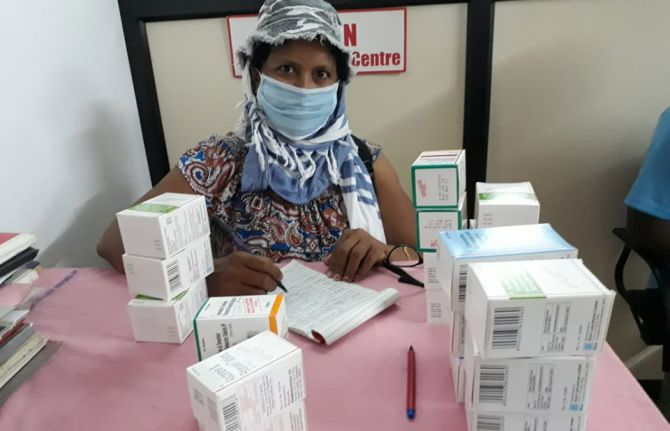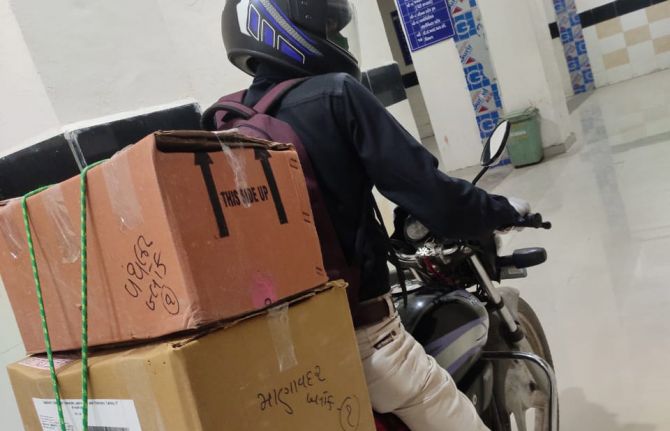



Feature Story
Mitigating the impact of the COVID-19 pandemic among people living with HIV in India
06 May 2020
06 May 2020 06 May 2020For the more than 3000 people, including 330 children and adolescents, living with HIV and on antiretroviral therapy in Goa, India, the COVID-19 outbreak is a time of worry—they are worried about COVID-19 and they are worried about being able to stay on their HIV treatment during the lockdown in India.
In order to respond to one of those worries, the team at the Human Touch Foundation, a community-based organization that provides care and support to children and adolescents living with HIV, has, since the start of the lockdown, organized a force of volunteers to deliver antiretroviral therapy to people’s doorsteps.
Health officials at the HIV clinics provide a list of people who need deliveries of antiretroviral therapy, after making sure that the beneficiaries consent. Alternatively, several beneficiaries connect with the Human Touch Foundation directly for a supply of medicine.
“Most people living with HIV are still hiding their HIV status and do not wish that we come directly to their homes for the delivery. With poor mobile connectivity, in many cases we have no option rather than make more than two trips, instead of asking their location with the villagers,” said Peter Borges, the founder and Chief Executive Officer of the Human Touch Foundation.
Along with antiretroviral therapy, the Human Touch Foundation also provides essential groceries—rice, lentils, grams, oil and milk—for children and adolescents living with HIV and their families. “Many children and adolescents are with anxiety and depression, mostly concerning their survival, due to loss of income of their families and scarcity of essential supplies,” said Mr Borges. Bars of soaps are also provided with the packages, distributed in collaboration with UNAIDS, Reckitt Benckiser, the Just Imagine Trust and the Rotary Club of Panaji Riviera.
The Human Touch Foundation is also offering online psychosocial support to children and adolescents living with HIV. “We have streamlined our communication through telecounselling and support. We have a staff team giving coordinating and rendering support to the field team through assessment of the family,” Mr Borges added.
Similar efforts are being undertaken in Bangalore to support people living with HIV. Champion in Me, a community-based organization that provides care, support and skills to adolescents and young people living with HIV, has built a support system to reach out to communities during the lockdown. A force of young volunteers has partnered with the Karnataka Network of Positive People to distribute medicines to 140 people and food provisions to 1200 people. “I praise the courage of our volunteers and supporters that came out to help people living with HIV, in a time of crisis. This is when our organizations and leaders have to stand tall and join efforts to make sure nobody is left behind,” said Elvis Joseph, the Director of Champion in Me.
At the national level, the National Coalition of People Living with HIV in India (NCPI+) is coordinating efforts with the National AIDS Control Organisation (NACO) and other partners, including UNAIDS, to ensure adherence to treatment and a continuum of care for people living with HIV.
“Since the lockdown started, the National Coalition of People Living with HIV in India established a good communication platform through WhatsApp and emails connecting the National AIDS Control Organisation and networks of people living with HIV to closely monitor challenges, find joint solutions and help coordination,” said Daxa Patel, the President of NCPI+ and the Secretary of the Gujarat State Network of People Living with HIV. As a result, NCPI+ has helped more than 45 000 people living with HIV in India to get home deliveries of antiretroviral therapy.
“HIV-affected communities have played an important role delivering antiretroviral therapy to people who were not able to collect it themselves. The Human Touch Foundation, Champion in Me and the National Coalition of People Living with HIV in India are just some examples of what can be done at the national, state or city level by communities themselves. Many local solutions have been put in place in a joint effort between the government, UNAIDS and community-based organizations to get medicines, food or soap delivered to those in need,” said Bilali Camara, the UNAIDS Country Director in India.



